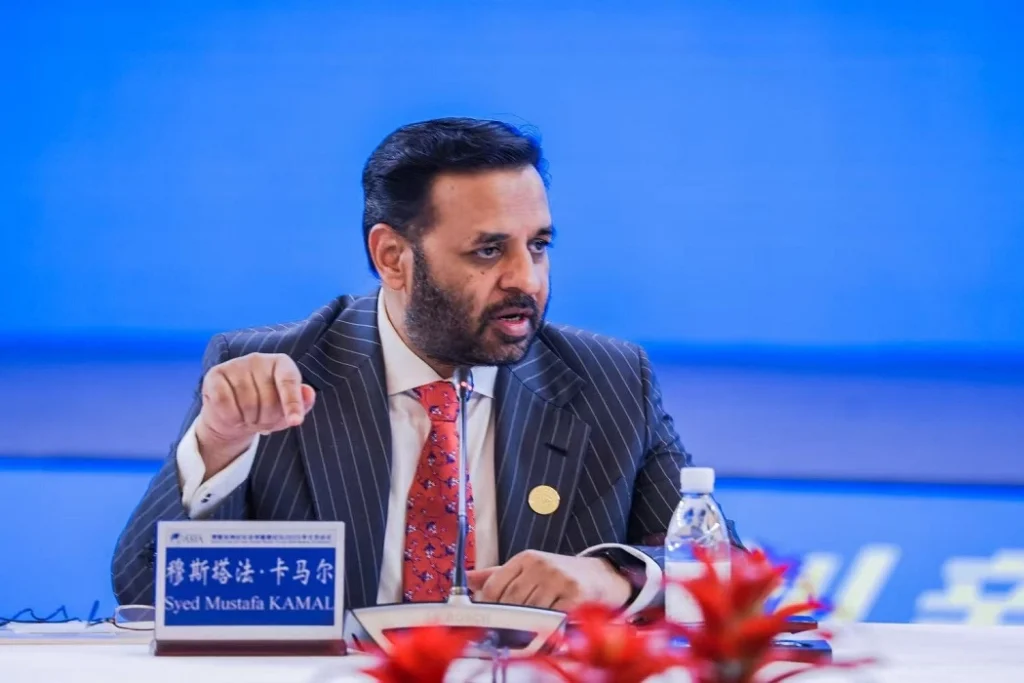Federal Minister for Health Mustafa Kamal chaired a high-level review meeting of the Sehat Sahulat Program, reaffirming the government’s commitment to delivering universal and equitable access to healthcare for all citizens of Pakistan.
The Chief Executive Officer of the Sehat Sahulat Program presented a comprehensive briefing on the current performance, gaps, and proposed roadmap of the initiative, which has become a central pillar in Pakistan’s healthcare transformation journey.
Healthcare is a Right, Not a Luxury
Minister Mustafa Kamal emphasized that healthcare is not a privilege for a few it is a fundamental right of every human being. He stressed that the Ministry of Health is actively working to ensure that free and essential health services are accessible to all 240 million citizens, regardless of income, location, or background.
Commitment to Global Health Goals
Pakistan has already signed on to Universal Health Coverage (UHC) as part of its commitment to Sustainable Development Goal 3 (SDG 3). The country is bound to implement UHC services well before the 2030 deadline, and the Ministry is aligning all national strategies to meet this global benchmark.
Current Spending, Persistent Gaps
Despite the federal and provincial governments spending over PKR 1,154 billion annually on healthcare, the ground reality reveals critical gaps in the availability and quality of services. The Minister acknowledged that:
- Public trust in government healthcare systems remains low
- Basic health services are still inaccessible for large segments of the population
- Urban-rural disparities and mismanaged resource allocation continue to undermine healthcare outcomes
A New Vision for Public Health Under Mustafa Kamal
The Ministry, under the leadership of Mustafa Kamal, is pursuing a bold new vision for healthcare reform. The central goal is to provide inclusive, accessible, and trustworthy healthcare to every Pakistani—leaving no one behind.
He reiterated that no citizen should be deprived of essential health services, and that healthcare delivery must inspire public confidence and meet the highest standards of reliability.
Ground Realities Informing a Smarter Strategy
The Ministry has conducted a thorough analysis of:
- On-the-ground healthcare conditions
- Institutional performance at provincial and federal levels
- Budgetary inefficiencies and gaps in delivery mechanisms
This data-driven approach has allowed the Ministry to uncover that more efficient, higher-quality services can be delivered at a cost much lower than the current PKR 1,154 billion if governance and systems are restructured correctly.
Comprehensive and Integrated National Healthcare Plan
To address these systemic issues, the Ministry of Health has developed a comprehensive, integrated national healthcare plan. This plan:
- Focuses on efficient resource utilization
- Strengthens health governance and accountability
- Enhances primary care systems
- Emphasizes preventive healthcare over reactive treatment
The plan is currently undergoing internal consultation and refinement, and will be formally submitted for approval by the Prime Minister before being shared with the public.
Ongoing Policy Dialogue and National Consultation
The Ministry has initiated serious and inclusive policy consultations, involving experts, healthcare workers, technocrats, and provincial leadership. The aim is to build a national consensus around a shared healthcare vision that:
- Meets constitutional and ethical obligations
- Aligns with international commitments
- Delivers real results for people on the ground
Conclusion
Under the firm leadership of Federal Minister Mustafa Kamal, the Ministry of Health is crafting a bold roadmap to guarantee universal healthcare access for every citizen of Pakistan. By focusing on public trust, efficient use of resources, and healthcare equity, this reform agenda seeks to reshape Pakistan’s health system for the future ensuring that no Pakistani is left behind in accessing their basic right to quality healthcare.



Comments (0)
No comments yet. Be the first to comment!
Leave a Comment